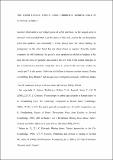Files in this item
The loser leaves (Rome's loss) : Umbricius’ wishful exile in Juvenal, Satire 3
Item metadata
| dc.contributor.author | Geue, Tom Alexander | |
| dc.date.accessioned | 2016-07-14T16:30:05Z | |
| dc.date.available | 2016-07-14T16:30:05Z | |
| dc.date.issued | 2015-12 | |
| dc.identifier | 218878116 | |
| dc.identifier | 320b76e0-7c83-49d2-b6da-218319e7a298 | |
| dc.identifier | 84971633028 | |
| dc.identifier.citation | Geue , T A 2015 , ' The loser leaves (Rome's loss) : Umbricius’ wishful exile in Juvenal, Satire 3 ' , The Classical Quarterly , vol. 65 , no. 2 , pp. 773-787 . https://doi.org/10.1017/S0009838815000130 | en |
| dc.identifier.issn | 0009-8388 | |
| dc.identifier.other | ORCID: /0000-0003-0148-3393/work/83481939 | |
| dc.identifier.uri | https://hdl.handle.net/10023/9130 | |
| dc.description.abstract | Juvenal's third satire is a privileged piece of verbal diarrhoea. As the longest satire in Juvenal's well-attended Book 1, as the centre of this book, and as the one Juvenalian jewel that sparkles ‘non-rhetorically’, it has always been the critics’ darling. Its protagonist, on the other hand, has not always been so popular. Recently, reader sympathy for old Umbricius (the poem's main speaker) has shifted to laughter in his face; the old sense of ‘pathetic’ has ceded to the new. One of the central strategies of the ‘Umbricius-as-caricature’ camp has been to point to the overtime worked by ‘mock-epic’ in this poem: Umbricius self-inflates to become another Aeneas, fleeing a crumbling Troy (Rome). But an oppositio is wedged in imitando. Umbricius makes his lengthy verbal preparations to depart from Rome for Cumae; Aeneas had come to Rome through Cumae. Umbricius withdraws to set up shop in the meagre countryside; Aeneas had escaped to cap his exile teleologically with the (pre-foundation of the) Greatest City That Will Ever Be. Still, Virgil's paradigm tale of displacement, drift and re-establishment underlies Umbricius' self-definition as an exile. Indeed exile, with a large and ever-increasing stock of mythical and historical examples, was a situation ripe for self-mythologizing. Umbricius stands in Aeneas' shadow then, standing it on its head. His recession also makes him into a Iustitia/Dikē figure, the final trace of the golden age, off to alloy himself elsewhere. In his mind, exile is rationalized by distinguished past examples; in ours, we laugh at how disparate example and man really are. That side of Umbricius has been done to death; or at least, for present purposes, to exile. | |
| dc.format.extent | 15 | |
| dc.format.extent | 229714 | |
| dc.language.iso | eng | |
| dc.relation.ispartof | The Classical Quarterly | en |
| dc.subject | PA Classical philology | en |
| dc.subject | T-NDAS | en |
| dc.subject | BDC | en |
| dc.subject | SDG 3 - Good Health and Well-being | en |
| dc.subject.lcc | PA | en |
| dc.title | The loser leaves (Rome's loss) : Umbricius’ wishful exile in Juvenal, Satire 3 | en |
| dc.type | Journal article | en |
| dc.contributor.institution | University of St Andrews. Centre for the Literatures of the Roman Empire | en |
| dc.contributor.institution | University of St Andrews. School of Classics | en |
| dc.identifier.doi | https://doi.org/10.1017/S0009838815000130 | |
| dc.description.status | Peer reviewed | en |
This item appears in the following Collection(s)
Items in the St Andrews Research Repository are protected by copyright, with all rights reserved, unless otherwise indicated.

